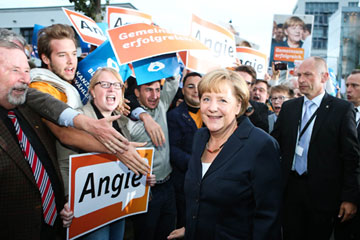
German Chancellor Angela Merkel greets her supporters outside a studio ahead of the TV debate in Berlin, Germany, Sept. 1, 2013.
Angela Merkel has a face she makes when things don't go according to plan. She has arrived in Recklinghausen, a city in Germany's industrial Ruhr district, to deliver a stump speech at a rally of her Christian Democratic Union party (CDU) ahead of elections on Sept. 22. As protesters whistle and heckle, she narrows her eyes and stares into the distance. This isn't an angry expression. Merkel is doggedness personified.
Germany's first female Chancellor and the first raised behind the Iron Curtain has already gone down in history as a trailblazer. Now, after nearly eight years in charge of Europe's richest nation, with her policies affecting the citizens of the entire euro zone and rippling outward to capital cities around the globe, she is pushing for a third four-year term. She looks likely to succeed.
That alone makes her remarkable. The euro-zone crisis has derailed or damaged most leaders in its vortex. Merkel has thrived. A poll published on Aug. 23, the day of the rally, reveals that 63% of voters favor her return to office. Her nearest rival, the Social Democrats' Peer Steinbrück, lags at 29%. The CDU and its Bavarian sister party, the Christian Social Union, enjoy an advantage of about 15 percentage points. But the quirks of the German electoral system, designed amid the rubble of Adolf Hitler's dictatorship to dissipate power rather than concentrate it, mean that Merkel has a real battle on her hands — and so she fights, rally by rally, town by town.
Ralf Möller greets her at the Recklinghausen podium. The 6-ft. 5-in. (196 cm) former champion bodybuilder and Gladiator actor (he played Hagen, a Germanic barbarian, in the Oscar-winning epic), who was born in the city and these days is literally big in Hollywood, has flown from Los Angeles to lend his considerable muscle to Merkel's cause. "This is what I admire," he says, watching his petite heroine plow on with her speech. "She overcomes."
Nothing showcases the steady, reliable, fuss-free Merkel brand better than adversity — and this campaign season is serving up plenty. Greece is ripe for another bailout. The crisis in Syria has raised uncomfortable questions about Germany's willingness to match its economic heft to its responsibilities as a global citizen. And allegations about the scooping up of German data by the U.S. National Security Agency are roiling public opinion. Protesters at the rally blow whistles and brandish a banner emblazoned with the slogan NIE WIEDER ÜBERWACHUNGSSTAAT — never again a surveillance state.
None of the protesters appear much older than 30; for younger Germans, any debate about freedom — and its curtailment — is primarily intellectual. For Merkel, who spent the first 36 of her 59 years navigating a society that embroiled hundreds of thousands of her compatriots in spying on the others, there is no such abstraction. Communist East Germany shaped the reflexes of caution and concealment that originally helped Merkel swerve and maneuver her way to high office and put the iron in her soul that keeps her fighting to stay there.
The German economy is giving her a helping hand, with the latest data showing a narrow budget surplus, moderate growth and unemployment at 6.8%, close to its lowest ebb in two decades. To enjoy similar prosperity — and in return for German largesse — the weaker euro-zone nations must reform. That is Merkel's mantra. "Solidarity makes sense if we all work to become better, fitter," she tells the Recklinghausen crowd. "Otherwise we'll become weaker together."
Her critics say this is happening already on Merkel's watch. Greece isn't the only country that has been slow to make structural reforms. Merkel has governed in what she calls "small steps," avoiding the sort of big, transformative initiatives that might, for example, bolster Germany against challenges like its rapidly aging population. She has calmed the strains in the euro zone by deploying what German philosopher Jürgen Habermas recently dubbed "tranquilizing fiddling about." Even her friends admit that under the Merkel administration, there hasn't been a clear vision for Germany's international role and responsibility. "With the importance Germany now has in the world, you can't be undecided," says Lothar de Maizière, Merkel's first political mentor, who served as elected leader of the German Democratic Republic (GDR) before its absorption into reunited Germany.
